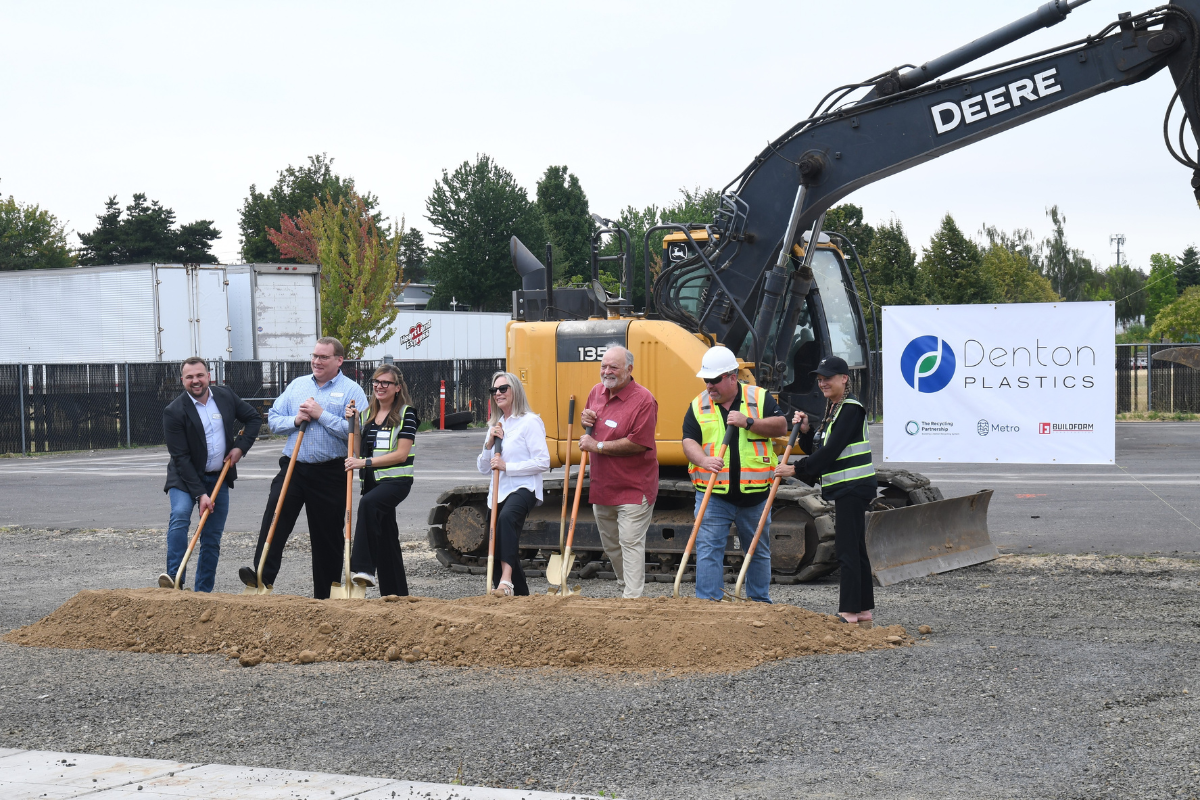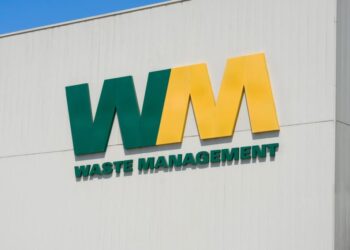Denton Plastics has broken ground on a major expansion of its polypropylene recycling operations in Oregon, a move hailed as both strategic and timely amid the state’s evolving recycling landscape.
The family-run company plans to construct an 18,000-square-foot facility at its Portland site to double its storage capacity and replace inefficient trailer storage with a streamlined, weather-protected operation. That will be paired with a new Tomra flake sorter and an extended conveyor system boosting robotic sorting to reduce contamination and improve throughput. Denton expects to increase its annual PP processing from 1.4 million pounds in 2023 to 2.6 million pounds by 2026. The company’s current wash line runs at 1,000 to 1,500 pounds per hour, but it is built to handle up to 8,000 pounds per hour, meaning the upgrades could unlock a large surge in output.
The total project carries a price tag of about $2.042 million. Funding includes a $500,000 grant from Metro’s Investment & Innovation program, $950,000 from The Recycling Partnership (TRP), and a $500,000 company match. Project timelines call for the structure and equipment to be operational by the fourth quarter of 2025 to align with the Recycling Modernization Act, which established the state’s extended producer responsibility (EPR) program for packaging. The EPR program launched July 1.
Grant reflects Denton’s regional leadership
Brittany LaValley, vice president of material systems at TRP, said Denton’s expansion was an ideal fit for the organization’s largest grant to date from the Polypropylene Recycling Coalition. She cited the company’s active role in the Pacific Northwest recycling network and its close engagement with the Oregon Department of Environmental Quality as EPR rolled out in the state.
“They have such a great understanding of the complexities of not just recycling in the Pacific Northwest and reprocessing, but EPR,” LaValley said. “We knew they were going to have a good understanding of what it meant to be an end market in that space.”
LaValley said too little PP is currently recycled in Oregon or the wider region, but the passage of EPR will bring an influx of material. “Denton was an amazing partner to be able to take on additional material with expanded capacity,” she said.
TRP has awarded nearly 80 grants in the last five years and LaValley said the Denton project demonstrates how its granting process has evolved in response to policy changes. She noted that Oregon’s EPR program will bring unprecedented funding into the state’s recycling system, with California, Colorado and other states following close behind.
“Policy is truly a game changer in the United States,” she said. “Implementation is barreling ahead. Obviously, Oregon has implemented, with California, Colorado not far behind. We are seeing an optimistic snowball effect.”
Building end markets for Oregon material
Metro oversees regional solid waste systems and promotes efforts like Denton’s to modernize recycling capacity. TRP’s funding underscores the role of philanthropic and public-private collaboration in building local end markets.
Nicole Janssen, president of Denton Plastics, said the expansion “is timely, strategic and fully aligned with the goals of the Recycling Modernization Act.” She said the company has recycled over 1 billion pounds of plastic and invested more than $2 million in new technology in the last four years alone. “One of those investments was the installation of a wash line in Oregon,” she added.
Denton accepted PP bales from Oregon MRFs until the end of the first quarter of 2024 but stopped due to high contamination rates. Company officials said only one Oregon MRF currently hand-sorts PP, making the process inefficient. With the new facility, Denton aims to support MRFs by accepting cleaner bales through automated sorting and supplying higher-quality material back to manufacturers.
Alex Bertolucci, communications manager for the Circular Action Alliance, the producer responsibility organization administering the state’s EPR program, said the expansion helps keep the recycling loop within Oregon. “The connection between the expanding recycling around the state and an end market within the state is very exciting. We’re taking Oregon materials, we’re collecting them from Oregonians and they’re being recycled in Oregon. That’s very exciting for us to have that circular economy right here in the state.”
LaValley said Metro’s contribution was another factor in accelerating the project. Denton secured the funding just before the program closed, which pushed the groundbreaking forward. “Those Metro funds have to be spent by the end of the year,” she said, adding, “They were one of the lucky ones to get some of that funding before the program shut down.”
With statewide PP collection set to begin next year, the expansion will give Denton additional storage and automated sorting capacity at a time when more material will be entering the system and the company claims that the upgrades should help keep a greater share of recovered plastic in Oregon’s economy.































